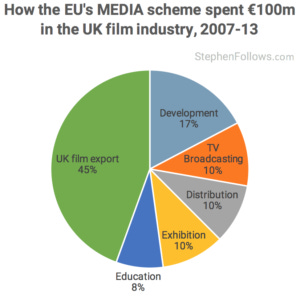How will Brexit affect the UK film industry?
Last Thursday, 52% of the UK voting population opted for the UK to leave the European Union (EU). I am going to avoid the political side of this conversation as it's been covered well elsewhere. I will also avoid sharing my own opinion on the matter as there are no shortage of people shouting off on one side or another.
However, I thought I can add to the conversation by looking at the numbers for how the British and European film industries interact and how Brexit will affect the UK film industry.
Note: A week later I have returned to the topic, based on more research and interviews with over 150 film industry professionals. Both articles address the topic from different angles, so after reading this one I suggest you head over to "What does a post-Brexit UK film industry look like?".
How will Brexit affect the UK film industry?
It's worth noting that a large part of the whole Brexit debate was taken up with discussing unknowns. Neither side has a magic crystal ball and so it's impossible to say for certain exactly what will happen in a post-EU UK. However, some outcomes are almost automatic, in that if the UK stops paying into the EU then it can expect to stop receiving money out of the EU. So, here is a rundown of the negative effects of Brexit to the UK film industry...

An end to MEDIA / Creative Europe funding (certain). Between 2007-13, the MEDIA scheme provided over €100 million towards various aspects of the UK film industry. The loss of this money is the biggest, clearest effect of Brexit and so I've addressed it in the section below.
In the short-term, British / European co-productions will be harder (very likely). Official co-productions allow international film producers to work together to create a film which can gain state protections and tax benefits from multiple countries at the same time. In the immediate future, co-productions between British and European countries will become harder, due to the fall in the value of the Pound and the growing uncertainty.
In the long-term, British / European co-productions may need new legislation (unclear). Official co-productions are only possible between countries which have signed a treaty defining co-production rules. The UK currently has active treaties with Australia, Canada, China, India, Israel, Jamaica, Morocco, New Zealand, the Occupied Palestinian Territories, South Africa and the EU. The European treaty is called the European Convention on Cinematographic Co-Production and was signed in October 1992 in Strasbourg. This treaty is not exclusively for just EU members as it refers to its signatories as "member States and the other States Parties to the European Cultural Convention". The UK signed the original treaty as a member of the EU so conceivably it would need to sign up again as a "European non-member State". Interestingly, the UK already has a separate co-production agreement with France, signed in 1994, so British / French co-productions may not be affected by Brexit in the same way co-productions with other EU member states are.
British content will be much less attractive to European broadcasters (almost certain). Some European countries have quotas on the amount of European content their exhibitors and broadcasters must show. For example, the majority (i.e. minimum of 51%) of French entertainment broadcast transmission time must be taken up with programs of European origin. Not only did this increase demand for native UK films and television shows but it also made UK / US co-productions more attractive. For example, 'The Night Manager' was a £30 million co-production between the BBC and AMC, which also qualified as an EU production. In a post-Brexit world, it is very unlikely that such products will be classed as 'European' and will therefore lose a large part of their value to European countries with such quotas.
Increased complexities for international cast and crew (possible but unclear). One of the features of a unified Europe is the free movement of people, goods and services. New visa requirements and work permits could affect both British people filming in Europe and European people filming in the UK. That said, the issue is a little more complicated than just 'in or out' of the EU. This passport and border controls are covered not by the EU but instead by the Schengen Agreement, and only 22 of the EU's 28 member states are currently signed up (also, the UK and Ireland have certain opt-outs), In addition, Iceland, Lichtenstein, Norway and Switzerland are members of the Schengen Area but not of the EU. The basics of the free movement of people and services is also not simply an EU issue, but was instead established in the Treaty of Rome. So it's not clear what would happen post-Brexit as new agreements will need to be reached in order to keep the free movement protections the film industry has enjoyed until now.
Fewer UK films will be distributed in Europe (certain). EU funding has supported the export of UK film to Europe to a massive degree. In fact, between 2007-13, almost €45 million was spent to bring UK films to European cinema audiences. Details of which films were supported follow in the next section.

Fewer international films will be distributed in the UK (certain, although the extent is unknown). Between 2007-13, UK-based businesses received over €20 million in EU funding to support the release of European films in the UK. In addition, if Brexit continues to cause a weak Pound then it becomes more expensive for UK distributors to acquire new content. However, this will affect all UK distributors equally, so may only reduce the amount UK distributors can pay upfront (known as the Minimum Guarantee, or MG) rather than prevent distribution entirely.
UK independent cinemas will lose income. (certain, although the extent is unknown). 56 UK independent cinemas receive funding from the EU as part of the Europa Cinema scheme, which supports cinemas which commit an average of 67% of their programming to European films. Between 2007-13, this averaged out to over €103,000 per cinema.
The negative effect of uncertainty (very likely). The film industry is highly fickle and responds negatively towards uncertainty. This is partly due to the large amounts of money at stake and the desire to reduce risks wherever possible. Right now no-one is sure what effect Brexit will have on the UK film industry, and so it may seem a safer bet to wait this period of change out before investing in UK film productions.
Loss of influence on European rules affecting UK content (certain but effects unknown). By leaving the EU, the UK will forfeit its right to influence EU policy towards film and television content. This will most acutely be felt in the discussions around the proposed Single Digital Market, which aims to force distributors to treat the EU as one territory, rather than distributing films country-by-country as happens today.
Despite these negative effects, Brexit could be positive for the UK film industry in the following ways...

It becomes cheaper to shoot in the UK (uncertain). If the Pound continues to lose value (as it has since the Brexit voted was announced) then the UK becomes ever-cheaper for foreign productions to set up shop in the UK. This will have the biggest effect on Hollywood studios, who spend vast sums of money and whose green-screen epics can be shot almost anywhere in the world. Between 2006-15, UK / USA studios films spent £7.7 billion in the UK, accounting for 68% of the money spent on UK films.
The UK is free to change its tax rules (certain). The current Film Tax Relief (FTR) scheme is very generous and offers producers a refund worth around a fifth of the money they spend on UK films in the UK. As a member of the EU, the UK is bound by rules on State Aid and does not have a free hand to change government incentives and subsidies without EU approval. When the FTR first came in, it gave points for various elements being British, such as the cast, crew, languages used, etc. However, EU rules have forced the UK to widen the criteria to favour all Europeans equally. This means that it is now possible to have a film that qualifies as fully "British" with an all-Italian crew, based on a Spanish story, told in German. Leaving the EU will remove these restrictions on UK film tax policy. This freedom will mostly benefit the unseen civil servants who draw up the actual tax laws, but this increased flexibility means that in theory our film incentives can be changed more often and be better tailored to the needs of the UK film industry.
Avoid proposed new European rules on release patterns (certain freedom from a possible event). As discussed above, the Single Digital Market could mean that films need to be released in Europe as one territory all at once. It's not certain how the new rules will eventually be written, but if we're out of the EU then we're certainly not going to be part of it. This will still affect British films exported to Europe but not films released in the UK.
The UK can spend that saved money directly on UK film (extremely unclear). In theory, the UK can use the money saved by not paying into the EU to directly replace the money and support that was lost by the lack of MEDIA funding. It remains unclear if the government wishes to do this.
How much has the MEDIA budget benefitted the UK film industry?
MEDIA currently provides money to the UK film sector for training, development, co-productions, festivals and theatrical distribution. Over a seven year period (2007-13), the EU provided over €100,000,000 towards various aspects of UK film industry. This breaks down as follows...

€44,561,008 - Awards to European distributors to release UK films
€10,478,771 - Investment in UK TV broadcasting
€8,898,821 - Distribution of European films in the UK
€7,830,252 - Development - UK Slate funding
€6,939,604 - Development - UK Single projects
€5,810,965 - UK cinemas part of the Europa network
€4,910,314 - UK-based training
€2,975,703 - UK VoD platforms
€2,775,444 - UK-based film courses and schools
€2,013,688 - Development - UK Interactive works
€890,530 - Grants to UK sales agents who represent non-UK European films
€85,0718 - UK pilot release programs
€695,500 - European Day-and-Date pilots
€539,766 - i2i Audiovisual (plugging finance gaps in UK / European co-productions)
€100,171,084 - Total
As mentioned above, UK films have received a huge amount of EU funding for their releases around Europe. These include...

The Iron Lady - €1,531,922 - 31 European territories
Slumdog Millionaire - €1,339,104 - 24 European territories
Quartet - €1,339,009 - 23 European territories
Looking For Eric - €1,297,031 - 26 European territories
Tamara Drewe - €1,239,843 - 22 European territories
The King's Speech - €1,025,717 - 26 European territories
The Last Legion - €1,025,551 - 3 European territories
The Duchess - €954,012 - 19 European territories
Shame - €951,814 - 27 European territories
Another Year - €914,330 - 21 European territories
I Give It a Year - €892,867 - 29 European territories
Streetdance 3D - €891,644 - 17 European territories
Salmon Fishing in the Yemen - €882,124 - 27 European territories
The Secret of Moonacre - €814,964 - 5 European territories
Song for Marion - €787,987 - 15 European territories
Happy-Go-Lucky - €750,173 - 24 European territories
Hysteria - €748,066 - 25 European territories
Fish Tank - €737,813 - 29 European territories
Nowhere Boy - €708,871 - 8 European territories
The Angels' Share - €699,286 - 27 European territories
A further €25,028,880 awarded to other UK films
Finally, it's worth mentioning some of the European films that have reached UK cinema audiences in part because of EU funding. These include A Prophet, The Great Beauty, Gomorrah, I Am Love, Persepolis, Love is All You Need, The Class, Amour, Potiche, Waltz with Bashir, Heartbreaker, Of Gods and Men, Blue is the Warmest Colour, Pina, Two Days In Paris, The Counterfeiters, The White Ribbon, Melancholia, Antichrist and Molière.
What is the UK film industry's opinion on Brexit?
It's fair to say that the vast majority of people working in the UK film industry are firmly against the UK leaving the EU. UK arts pressure group the Creative Industries Federation say that 96% of its members supported the Remain campaign and 84% said that EU membership was important to the future of their organisation. A poll by Media Business Insight found that 66% of people working in the UK film industry felt that Brexit would have a negative impact on the sector. A further 18.5% were uncertain on the outcome of Brexit, with only 11.5% believing that Brexit would be positive for the UK's film industry.
So why are so many UK film professionals against Brexit? This could be for a number of reasons...
Political values. The film industry is traditional a fairly liberal-minded industry and the liberal cause is largely pro-EU.
Geographical location. The majority of UK film jobs are located in London and London was a hotbed of anti-Brexit sentiment (60% of London voters opted to Remain).
Age. The film industry has much lower age profile than the UK population, and polls have shown how the majority of those under 50 supported Remain while a majority of those over 50 supported Leave.
Fear of uncertainty. The UK film industry is in a period of stable growth, thanks in large part to a stable government approach to film incentives. Uncertainties in the future could scare off investors and studios from making investments in UK films.
The majority of predictable outcomes to the UK film industry are negative. The list at the top of this article shows how the vast majority of expected Brexit outcomes are negative for UK film.
Here is a summary of press coverage on the issue...

Screen Daily says that the UK film and TV sectors are in "limbo" and that "the two sectors had recently expressed strong sentiment in favour of remaining in the European Union, which is the major trade partner of the UK and which provides millions of pounds in subsidies to the UK market as well as a number of frameworks for coproduction. That structure is now in serious doubt".
Variety collected views from a number of major voices in UK film, summing them up by saying "British voters’ stunning decision to turn their backs on the European Union has left many of the country’s leading TV and film players reeling".
The Guardian summed up the situation by saying that there would be "less cash, fewer movies" and also that "we could witness a 70s-style British film meltdown".
The Hollywood Reporter led with "U.K. Producers Oppose Brexit", pointing out that "James Bond producer Barbara Broccoli, veteran David Puttnam, Matthew Vaughn, The King’s Speech producer Iain Canning, Slumdog Millionaire's Christian Colson and Aardman Animations are among those who outlined their reasons for why staying in the EU is the right call for those who want "to support our current, thriving creative industries."".
Broadcast magazine noted that shares in ITV dropped 19% within a day of the vote being announced, and the Sky share price also fell 8%. Further drops were felt by eOne and Vivendi.
The Verge discussed the possible effect of Brexit on 'Game of Thrones', saying "US productions might feel the effect, too. Much of HBO's Game of Thrones is filmed in Northern Ireland, for instance, partly supported by the European Regional Development Fund. HBO, however, says it doesn't anticipate any financial impact on GoT, since the network took no money from the ERDF for the last few seasons, according to Entertainment Weekly".
And the Radio Times pointed out one aspect of Brexit too many experts have overlooked by noting "The shock Brexit result will have massive ramifications – not least the fact that we may see less of beautiful French actress Clémence Poésy on TV".
A number of top UK film voices have shared their views and I could fill an entire article with them. However, for the sake of brevity, here are five which seem to sum up the mood...

Harvey Weinstein said "I'm shocked... These guys who voted, voted out of fear. It’s a huge mistake... It could be very costly in the movie and TV industry in terms of content branding. European branding is very important. It’s a big deal for these young British filmmakers”.
Michael Ryan, Chairman of the Independent Film & Television Alliance, said "The decision to exit the European Union is a major blow to the UK film and TV industry. Producing films and television programs is a very expensive and very risky business and certainty about the rules affecting the business is a must. This decision has just blown up our foundation — as of today, we no longer know how our relationships with co-producers, financiers and distributors will work, whether new taxes will be dropped on our activities in the rest of Europe or how production financing is going to be raised without any input from European funding agencies. The UK creative sector has been a strong and vibrant contributor to the economy — this is likely to be devastating for us".
Danny Perkins, head of Studiocanal UK said "Short term it’s bad news for the currency and terrible news for film acquisitions, which are normally done in dollars or euros. UK companies will suffer in the short term".
Rebecca O’Brien of Sixteen Films said "It has blown us out of the water. We are very dependent on our relations with Europe. All of our films for the last 20 or 25 years have been co-productions with Europe. It (Brexit) doesn’t mean they will stop immediately but it means that trade, and access and all those things are much more difficult. It just means we have to re-invent the wheel again".
Jeremy Thomas of the Recorded Picture Company quoted Charles Bukowski by saying that “the problem with the world is that the intelligent people are full of doubts, while the stupid ones are full of confidence". Mr Thomas added "For the film industry, it is a disaster".
So what now?
So many of the effects of Brexit are unknown. Right now, the only thing that has happened is that a non-binding referendum was marginally won by the pro-Brexit movement. There's no doubt that the majority of the UK film industry hopes that Brexit doesn't happen. Failing that, the film industry is likely to seek the following outcomes from the government...
A deal to retain co-production advantages with EU countries. Most likely this means ensuring that the UK remains signed up to European Convention on Cinematographic Co-Production.
An agreement to classify UK content as "European" in relation to production and distribution quotas. This is a harder task than the co-production deal, although it should be noted that Switzerland has already achieved this for their content.
Replacement funding be provided for current MEDIA-funded activities. A major claim of the Leave campaign was that the UK would save £350 million a week by leaving the EU. It turns out that once you take into account the UK's rebate the real saving is far lower, but even taking that into account, the money saved by leaving the EU could be used to replace the funding currently provided by MEDIA.
Action to be taken swiftly and confidently. A protracted and messy exit will create a large amount of uncertainty and stifle investment in UK film.
Epilogue
Sorry if you were expecting to be able to read my final article in my series on film locations today. I have had a number of people ask me about how Brexit will affect the film industry so I bumped the film locations article to next week. Stay tuned...


